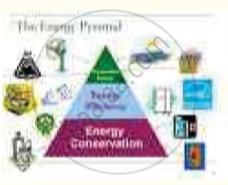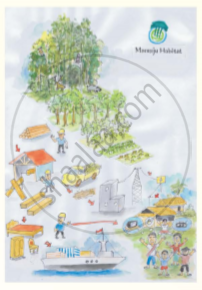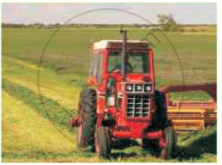Advertisements
Advertisements
Question
Here are some direct quotations from the story. Identify the speaker and write what each quotation suggests about the speaker. You can use the adjectives given in the box and may also add your own.
| amiable, tender, gentle, sympathetic, understanding, determined, diligent, kind, concerned, systematic, wise, helpful, enthusiastic, selfish, cruel, humble, religious, prudent |
| Speaker | Quotation | Quality Highlighted | |
|
a. |
'Avva, is everything all right? Are you O.K.?' |
||
| b. | 'At times, I used to regret not going to school, so I made sure that my children and grandchildren studied well.' |
||
| c. | 'Avva, don't cry. What is the matter? Can I help you in anyway?' |
||
| d. | 'We are well-off, but what use is money when I cannot be independent.' | ||
| e. | 'I will keep Saraswati Pooja day during Dassara as the deadline.' | ||
| f. | 'For a good cause if you are determined you can overcome any obstacle.' | ||
| g. | I am touching the feet of a teacher not my granddaughter.' |
Solution 1
| Speaker | Quotation | Quality Highlighted | |
|
a. |
The narrator | 'Avva, is everything all right? Are you O.K.?' | concerned sympathetic, helpful |
| b. | The grandmother | 'At times, I used to regret not going to school, so I made sure that my children and grandchildren studied well.' |
wise, understanding |
| c. | The narrator | 'Avva, don't cry. What is the matter? Can I help you in anyway?' | Sympathetic/helpful, amiable |
| d. | The grandmother | 'We are well-off, but what use is money when I cannot be independent.' | prudent |
| e. | The narrator | 'I will keep Saraswati Pooja day during Dassara as the deadline.' | determined, religious |
| f. | The grandmother | 'For a good cause if you are determined you can overcome any obstacle.' | enthusiastic; diligent |
| g. | The grandmother | I am touching the feet of a teacher not my granddaughter.' |
respectful, humble |
Solution 2
| Speaker | Quotation | Quality Highlighted | |
|
a. |
The narrator | 'Avva, is everything all right? Are you O.K.?' | concerned sympathetic, helpful |
| b. | The grandmother | 'At times, I used to regret not going to school, so I made sure that my children and grandchildren studied well.' |
wise, understanding |
| c. | The narrator | 'Avva, don't cry. What is the matter? Can I help you in anyway?' | Sympathetic/helpful, amiable |
| d. | The grandmother | 'We are well-off, but what use is money when I cannot be independent.' | prudent |
| e. | The narrator | 'I will keep Saraswati Pooja day during Dassara as the deadline.' | determined, religious |
| f. | The grandmother | 'For a good cause if you are determined you can overcome any obstacle.' | enthusiastic; diligent |
| g. | The grandmother | I am touching the feet of a teacher not my granddaughter.' |
respectful, humble |
APPEARS IN
RELATED QUESTIONS
In the sixth line of the first stanza, we read:
"... and sings a melancholy strain,..."
This "s" sound at the beginning of sings and strain has been repeated. Poets often do
this. Do you know why? Do you know what this "poetic repetition" is called? Can you
find other instances of this, in The Solitary Reaper?
Answer the following question.
The Poem invokes beautiful imagery which is built around 'sigh of the sea', 'laughter of
the field' and 'tears of heaven'. Explain the three expressions in the context of rain.
Working in pairs give antonyms of the following words.


‘Since’or‘For’
We often use the Present Perfect with time expressions using ‘since’ or ‘for’.
Which expressions go with since and which go with for? (Indicate with a tick). (The first two have been done for you.)
We use ‘since’ to express ______ in time, whereas ‘for’ is used to express ______ of time.
| since | for | |
| last week | ||
 |
 |
a short time |
| a decade | ||
| deepawali | ||
| the day before yesterday | ||
| centuries | ||
| june | ||
| 22 june | ||
| several weeks | ||
| 2009 | ||
| 6 months | ||
| ages |
(a) Answer the following questions:
- Where were the characters at the time of narration?
- Who was travelling with the aunt?
- How did the children pass their time?
- How long would they take to reach Templecombe?
- How does the aunt respond to the children’s antics? Why do you say so?
(b) You must have used a variety of articles in your answer. Why did you use them? Discuss the reasons with your teacher.
Study the following pair of sentences from the description. Notice the use of
articles-a, an or the or no article (X).
e.g. The next stop was at X Templecombe.
An aunt belonging to the children sat in one corner.
In the corner sat a stranger.
Hence we conclude
1. No article is used before a proper noun.
2. 'The' is used to refer to a specific place/person/ object.
3. 'A' is used when the person/place is referred to for the first time.
4. 'An' is used before a vowel sound.
After the role play, the Chairman will put forward the final decision with reasons.
Read the following excerpts from newspapers on various environmental issues.
Ban the Bag
The Indus Valley Civilisation left beautifullycrafted pottery that speaks volumes of the advances its people made. After 3,000 years, if the ruins we leave behind are excavated, chances are only plastic bags would be dug up. It may sound like an exaggeration, but these bags are not biodegradable. Apart from causing emissions when these are manufactured, noxious fumes are released while these are being burnt or disposed off. So, be kind to Mother Earth the next time you go shopping for groceries, remember to carry a cloth bag with you.

What India Should Do
India has released the National Action Plan on Climate Change. Is it adequate? Is there more that the country can do? Here are some ways how we can make a difference.
(a) SOLAR MISSION
1) To promote the use of solar energy through solar photovoltaic and thermal systems for power generation .
2) To integrate other renewable energy technologies like biomass and wind. 
(b) ENERGY EFFICIENCY
1) To mitigate GHG through sector-specific and cross-cutting technology and fuel switch options.
2) To use more LNG and biomass fuels besides seeking tech transfer. 
(c) SUSTAINABLE HABITAT
1) To promote energy efficiency in the residential and commercial sectors through LPG use.
2) To manage municipal solid waste and urban public transport in a better way. 
(d) WATER MISSION
1) To promote efficient water use, augment supply in critical areas and ensure effective management of water resources.
2) To have better management of surface and groundwater,and conserve wetlands. 
(e) SUSTAINING HIMALAYAS
1) To enhance monitoring and conservation of the Himalayan ecosystems, empower local communities for management of ecological resources and promote sustainable tourism. 
(f) GREEN INDIA
1) To reduce fragmentation of forests, enhance public and private investments for plantation, upscale joint forestry management and promote conservation of biodiversity. Need to afforest degraded lands.

(g) SUSTAINABLE AGRICULTURE :
1) To focus on four crucial areas - dry land agriculture, risk management, access to information and promoting the use of biotechnology.
2) To develop drought and pest resistant varieties. 
Work in pain and complete the table of the supernatural theories and logical explanations as presented in 'The Mystery of Bermuda Triangle'.

Classification
Look at the table below, showing the different meanings of connectors. Put words from the box into the correct categories. Some have been done for you as examples.

Now transfer the points from the Johari Window activity work sheet to the table given below.
• Common points listed by student and his partner in Column A and C - to be put in 'Open Self
• The qualities pointed out by the other person (not the student himself) - to be put in 'Blind Self
• The qualities pointed out by the students (Column A) but unknown to other person - to be put in 'Hidden Self
• Qualities unknown to student and his partner but which might be known to teacher or some body else may be put in 'unknown self
| Open Self | Blind Self |
| Hidden Self | Unknown Self |
